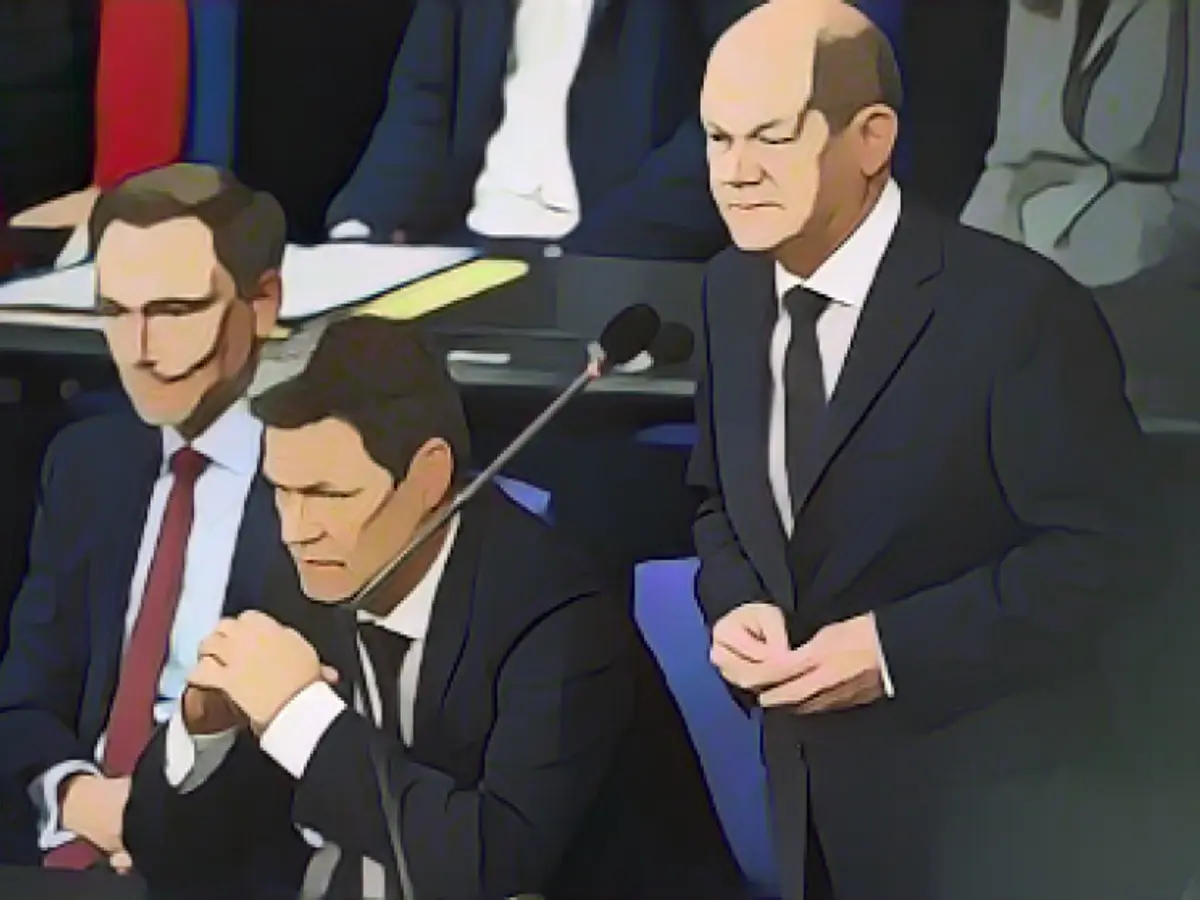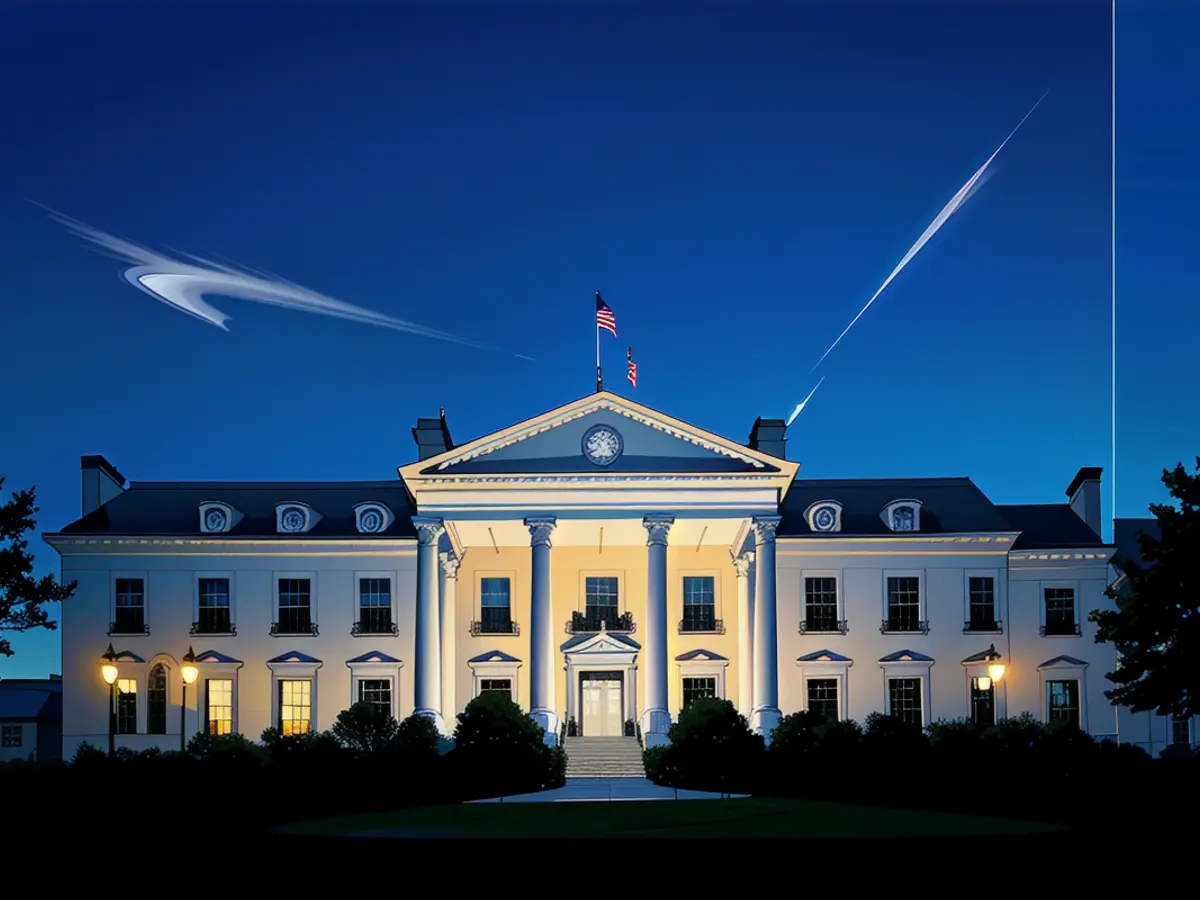The Great 60-Billion-Euro Mine: Who Pays the Price?
RUMMS: The Financial Green Light is Missing 60 Billion Euros!
The German Federal Constitutional Court has dealt a heavy financial blow: The highest judges have barred the government from simply channeling the remaining COVID-19 funds into the Climate and Transformation Fund (KTF). The Ampel coalition intends to use this side budget for climate protection and the substantial overhaul of the economy.
So, now comes the anxious query: How will the traffic lights repair this financial chasm? Who pays the bill?
Instead, Scholz, Lindner, and Habeck resort to an austere strategy: The 2024 federal budget will be approved as usual during the budget committee's meeting on Friday night. Explanation: The regular budget is untouched by the ruling.
To produce savings, the coalition partners intend to cut, trim, and prune.
Budget freeze for the KTF immediately following the ruling
However, there's an immediate consequence: Lindner ordered an immediate budget freeze for the KTF following the ruling. Starting now, no more funds can be released until the traffic lights agree on a savings plan. The only exception: funding for heat pumps and energy-saving home renovations will continue, as will projects that have already been contractually agreed.
Everything else is now up for grabs! And with it, thousands of industrial jobs.
►Example: The federal government plans on subsidizing the construction of the Intel chip factory with 10 billion. However, the contracts have yet to be signed, so the financial freeze takes effect. Planned billions in funding for steelworks to convert to eco-production without coal and gas are also in question.
The traffic light coalition will now enter into negotiations – if possible, by the end of the year – to determine which projects still have available funding. One commentator states, "This is nothing less than renegotiating the coalition agreement."
For the Greens, this is a do-or-die situation: Almost all of their pet projects are included in the KTF, which has lost 60 billion euros (currently over 100 billion, plus new revenue from the CO2 price).
Green parliamentary group leaders Britta Haßelmann (61) and Katharina Dröge (39) emphasized that the KTF programs are "extremely important for climate protection, reducing the burden on citizens, and promoting a sustainable economic policy."
What is already clear, however, is that there won't be any money left for the Green election promise of climate money (intended to alleviate the burden of rising CO2 prices). A traffic light budget: "Dead, dead, climate money."
And what does that mean for taxpayers?
►"Tax increases in these difficult economic times would be poisonous," says CDU finance expert Johannes Steiniger (36). He demands: The traffic light must "finally prioritize spending."
▶︎ However, SPD federal deputy Serpil Midyatli (48) advocates for tax increases for the wealthy: "The SPD would be prepared to reconsider fundamental distribution issues in order to improve the revenue side. For example, by increasing wealth and inheritance taxes."
Criticism comes from the environmentalists at Greenpeace: the Karlsruhe court's ruling is a "bitter blow for climate protection." Loans, new taxes, and the elimination of climate-damaging subsidies should no longer be taboo, advocates Greenpeace Germany Managing Director Martin Kaiser.
The traffic light coalition is now facing its greatest test.
Chancellor Olaf Scholz tried to inspiriting the SPD MPs in a hastily convened parliamentary group meeting: "We will face this situation bravely."
Scholz likely used the word 'bravely' multiple times within MPs. Scholz likely has his suspicions on how tough this is going to be for his government.
- After the Federal Constitutional Court's ruling, the SPD, FDP, and Greens' traffic light coalition propose to adopt the 2024 federal budget as usual, justifying that the regular budget is unaffected by the ruling.
- Lindner immediately enacted a budget freeze for the KTF following the ruling, halting further funding until the traffic lights agree on a savings plan.
- The tri-party coalition is now engaging in negotiations to determine which projects still have available funding, potentially renegotiating the coalition agreement.
- SPD deputy Serpil Midyatli advocates for increased wealth and inheritance taxes to improve revenue, facing criticism from environmentalists at Greenpeace who advocate for loans, new taxes, and the reduction of climate-damaging subsidies.
Source:
Enrichment Data:
The German Traffic Light Coalition, comprised of the Social Democratic Party (SPD), the Free Democratic Party (FDP), and the Greens, encounters significant challenges, including a funding gap and political instability, particularly after the collapse of the coalition and the subsequent national election in February 2025. Here’s how the situation unfolds and the implications for taxpayers and climate protection projects:
- Funding Gap and Political Instability:
- The coalition's collapse was primarily due to disagreements over fiscal policies and the handling of military aid to Ukraine. Chancellor Olaf Scholz removed Finance Minister Christian Lindner, who opposed plans to subsidize additional military aid with additional borrowing, resulting in the coalition's collapse.
- The end of the traffic light coalition and failure to pass a 2025 national budget creates a budget gap and political instability, making it difficult to address the funding gap effectively.
- Addressing the Funding Gap:
- To address the 60-billion-euro funding gap, the new government will need to implement significant fiscal measures. This can involve increased taxation, reduced public spending, or a combination of both.
- The Greens and other coalition partners have emphasized the need for substantial investments in climate protection and social infrastructure. However, these investments will need to be balanced with the need to reduce the budget deficit.
- Implications for Taxpayers:
- Increased taxation or reduced public spending can have significant implications for taxpayers. Higher taxes could result in increased costs for households and businesses, potentially affecting economic growth and consumer spending.
- Reduced public spending could adversely impact essential services like healthcare, education, and infrastructure, which are crucial for the well-being of citizens.
- Implications for Climate Protection Projects:
- The German government has committed to climate protection, as evident from its contributions to international climate initiatives. For example, Germany provided €1 million to the UN Climate Technology Centre and Network to support climate technology solutions.
- The current political instability and funding gap could jeopardize these commitments. Climate protection projects often require long-term funding and planning, which might be compromised if the government is unable to secure stable financial resources.
- Future Directions:
- The new government will need to prioritize investments in climate protection and social infrastructure while addressing the budget gap. This could involve innovative financing mechanisms, public-private partnerships, or strategic investments in sectors like renewable energy and sustainable transport.
- The European Investment Bank (EIB) and Allianz Global Investors have established the Emerging Markets Climate Action Fund, which aims to mobilize up to €7.5 billion for climate projects in emerging and developing countries. Germany's contribution to this fund demonstrates its commitment to global climate action.





